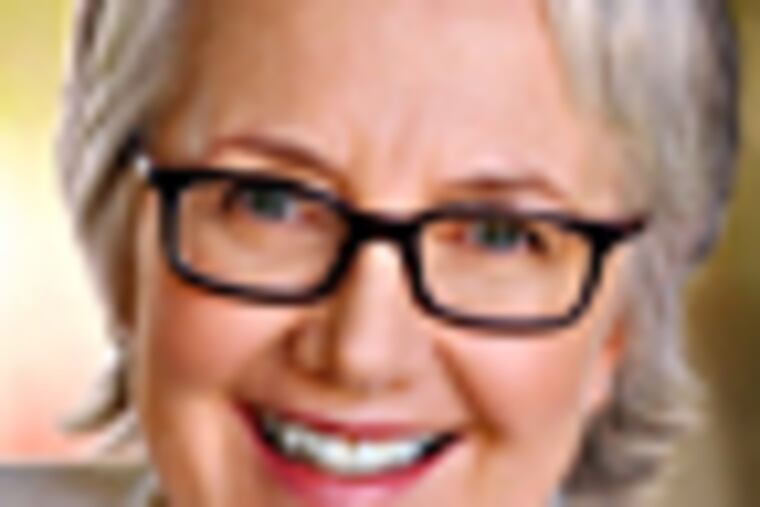Author brings parenting wisdom to gathering
Any parent who picks up one of psychologist Wendy Mogel's best-selling books may quickly feel as if she somehow sneaked a camera into your house.

Any parent who picks up one of psychologist Wendy Mogel's best-selling books may quickly feel as if she somehow sneaked a camera into your house.
There you are on Page 122, the mom and dad who don't get enough sleep because your child climbs into your bed every night. There you are again, obsessing over finding the perfect school.
Parents seeking an antidote to the constant pressure to both protect children from all possible problems and make sure they are superior students, athletes, and leaders have found a champion in Mogel.
In her two books, The Blessing of a Skinned Knee and The Blessing of a B Minus, she offers a countercultural manifesto against what she calls "overparenting," a toxic combination of coddling and unreasonable expectations.
"Children feel that every minute of every day, their whole future is on the line," Mogel said in an interview.
If the crowds who show up to see her talk are any indication, her message resonates.
When she spoke at Rodeph Shalom, a Jewish congregation in Center City, last month, about 1,200 people attended.
"Everybody is nodding their heads at her stories. As a parent, I'm often thinking, 'What would Wendy Mogel do?' " said Dena R. Herrin, president of the Rodeph Shalom board.
Parents who saw the speech describe Mogel as half-sage, half-stand-up comic.
Herrin said she loved Mogel's story about a client worried that her son was not living up to his potential because he spent too much time playing basketball with friends.
"How do you know?" Mogel asked the client. "That could be all there is."
It's a joke, of course, but it makes her point that most children probably will not be the next Einstein. Children often rebel against such pressure, Mogel said.
"In my practice, I use humor with my young clients, saying things like, 'Even though your parents desperately want you to do well on your Advanced Placement European history test, do you think you could study for it anyway?' " she said, describing a technique she has used to help teenagers act in their own self interest.
Some parents have formed discussion groups around Mogel's principles.
Jerilyn Dressler, a Fairmount resident and mother of a 20-month-old boy, just started one.
"I feel like parenting has evolved in such a way that it has become detrimental to kids today," Dressler said. "From what I see and what I read - and I read a lot - it sounds like kids are so over-scheduled, they're being raced around from dance class to soccer to tutors."
In the 1990s, Mogel started to notice increased anguish among families in her practice. Many parents, terribly concerned if a child was struggling in any way, hoped for some kind of diagnosis, such as a learning disorder, so that they could get it fixed and make the problem go away. They did not seem to accept that discomfort and even suffering are a natural part of life and can provide valuable lessons.
Gradually, Mogel, who had never been very religious, turned to traditional Jewish texts and teachings for answers to the problems her clients faced.
"Jewish wisdom holds that our children don't belong to us," Mogel says in The Blessing of a Skinned Knee. "They are both a loan and a gift from God, and the gift has strings attached. Our job is to raise our children to leave us. The children's job is to find their own path in life. If they stay carefully protected in the nest of the family, children will become weak and fearful or feel too comfortable to want to leave."
Although she steeped herself in centuries of Jewish learning to develop her guidelines, parents of all faiths and backgrounds have found them helpful.
She speaks out against putting too much pressure on children, but she also believes parents must be in charge. Families are not democracies. Too many parents, trying to ensure that a child feels listened to, turn their children into "little lawyers," she said, a phrase anyone who has argued with a 4-year-old over getting dressed for school will understand.
"What I say to parents all the time is I want you to be warmer and firmer, and the warmth part has to do with really seeing who your child is," she said. A child who is not naturally gregarious should not be expected to be a social butterfly. He should, however, be expected to master the basic etiquette of saying hello.
at 215-854-5520, hillmb@phillynews.com or @miriamhill on Twitter.
Read her blog on raising children in the city at www.philly.com/raising
philadelphia.
To learn more, check out "Overparenting Anonymous"